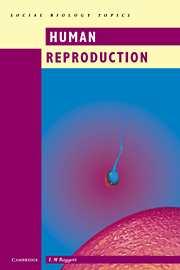Book contents
- Frontmatter
- Contents
- 1 Human reproductive strategies
- 2 Gamete production
- 3 Fertilisation
- 4 Implantation and pregnancy
- 5 Birth and lactation
- 6 Contraception
- 7 Human infertility: background and causes
- 8 Human subfertility: options and treatment
- 9 Ethical and moral considerations of fertility and infertility
- Index
9 - Ethical and moral considerations of fertility and infertility
Published online by Cambridge University Press: 05 June 2012
- Frontmatter
- Contents
- 1 Human reproductive strategies
- 2 Gamete production
- 3 Fertilisation
- 4 Implantation and pregnancy
- 5 Birth and lactation
- 6 Contraception
- 7 Human infertility: background and causes
- 8 Human subfertility: options and treatment
- 9 Ethical and moral considerations of fertility and infertility
- Index
Summary
Introduction
Four basic facts of life are:
organisms have no control over whether or not they become alive;
once alive they strive to say alive;
they have a strong and instinctive drive to reproduce (in humans this drive is fortified by a strong moral intuition);
they all eventually die.
The presumption in favour of life
Human beings, as organisms, are subject to these facts of life, but we are also able to rationalise and to moralise. We are able to recognise the basic instinct to preserve life in other people too, and appreciate that we have a moral duty to protect that instinct in them. This has been termed the ‘presumption in favour of life’, and for humans it is a fundamental fact of life: most people believe that matters relating to human life are of moral significance. As society has developed, this has become increasingly formalised in people's behaviour, to the extent that it is now enshrined in laws which are designed to protect life.
Reproduction is the single most distinguishing characteristic of life. It is the driving force of evolution, which is responsible for the diversity of plant and animal species on Earth. People are subjected to this force as much as any other organism, and a basic and powerful urge to reproduce is felt by most people at various times in their lives.
- Type
- Chapter
- Information
- Human Reproduction , pp. 94 - 109Publisher: Cambridge University PressPrint publication year: 1997



